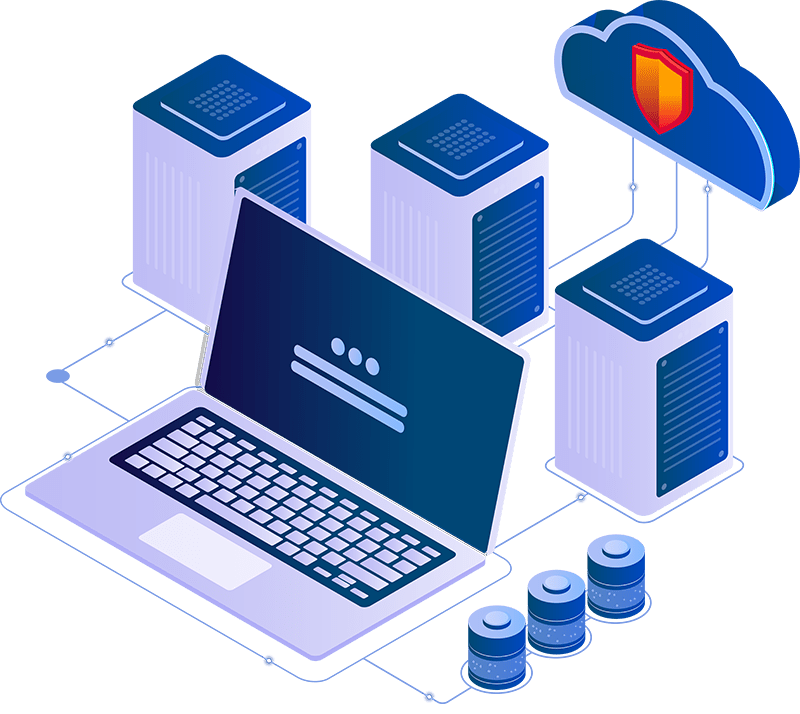
Understanding Managed IT Support
Connor Todd
8 minutes
Last updated:
Contents
What is Managed IT Support?
Managed IT support is a strategic outsourcing option where an external company, or Managed Service Provider, assumes the responsibility of managing and maintaining an organisation’s infrastructure, systems, applications and other technology-related resources.
This approach provides organisations access to the latest tools, technologies and highly skilled professionals who understand current industry best practices.
Outsourcing IT support can provide robust future proof solutions to modern IT challenges and allow companies to focus on their core operations without having to worry about the technical challenges of IT operations.

How Does Managed IT Support Work?
As opposed to traditional break/fix models, which offer a reactive response when issues arise, the objective of modern managed IT support is identifying and remediating the root cause of problems, proactively preventing future problems and ensuring minimal downtime, ultimately saving valuable time maintaining smooth workflow continuity.
Managed service providers (MSPs), such as Aspire, provide 24/7 services including:
- User and endpoint support.
- Managing and maintaining on-premise systems, cloud infrastructure, users and voice systems.
- Network monitoring & management.
- Software updates & maintenance.
- Data backup & recovery solutions.

Discover how we reduced an organisations support tickets by 78.7%
Challenges Managed IT Support Solves
As businesses become increasingly reliant on technology, the demand for high-quality managed IT support services is growing rapidly.
By outsourcing IT support to a reliable provider, organisations can solve a number of challenges that arise from managing IT entirely in-house. In this section, we will discuss three major advantages of employing managed IT support services: cost savings, increased efficiency, and enhanced security.

Difficulty Hiring Technical Teams
By outsourcing technical needs to an external team, companies can minimise their overhead and save resources typically designated for hiring and training highly skilled IT staff.
Cost savings can also be achieved as Managed Service Providers (MSPs) are also able to negotiate better discounts with vendors, guiding companies toward more cost-effective solutions.
Rising Security Threats
By employing best practices: maintaining baselines and enforcing regular system updates and patch management: MSPs ensure that software, firmware, and operating systems are up-to-date, reducing the risk of vulnerabilities. With a plethora of common security vulnerabilities, this is critical to every business.
Current Support Can’t Cope
Outsourcing IT support allows businesses to scale their IT resources up or down according to their needs. This flexibility is particularly beneficial for businesses experiencing fluctuating demand or undergoing periods of growth.
Not only does this allow businesses to scale their support to meet changing demand, it also provides the benefit of predictable monthly billing.
The Risk of Costly Down Time
MSPs proactively monitor systems 24/7 to identify issues before they disrupt business operations. This method decreases downtime while increasing productivity. When problems do arise, MSPs leverage their wealth of experience along with specialised teams and tools leading to faster resolutions.
Features of an Effective Managed IT Support Supplier
When selecting a Managed Service Provider, it’s crucial to find one that meets your organisation’s specific needs.
A suitable provider should complement your business operations and lighten the workload of your in-house team. Here are some important factors you should look for in a Managed Service Provider.
- Proactive Monitoring and Maintenance: As we’ve already stressed, the best IT support offers a proactive service that employs systems and processes that prevent issues in the first place. At Aspire, we have proven this with a 78.7% reduction in tickets raised by an organisation, by utilising the latest Micrcosoft tools.
- Flexible Solutions & Pricing: No business stands still and neither should your IT support. An effective IT service provider should be able to scale services and support to meet your business’s needs. Choosing a flexible partner means having access to cost-effective options without compromising on quality or service delivery.
- Experience & Expertise: If something goes wrong, you need a service provider with experience in all areas of IT support to help remediate any issues. Issues are rarely contained to a single endpoint, so working with an MSP with experience with Cloud, Connectivity, Networking and Security can be invaluable.
- 24/7/365 Customer Service & Support: Errors don’t always occur within working 9-5 hours. Working with a Managed IT Service provider who operates all hours can prevent issues advancing and get your business back to full operations as soon as possible.
- Proven Track Record and Reliability: The best tried and tested method of assessing how reliable a business is, is by looking at case studies and references. By looking at topic specific cases, you can get a feel for the types of solutions and services a company might provide and how well that aligns with your own goals.
By keeping these features in mind, you’ll be better prepared to find an IT support partner that meets your needs and requirements.
What Are the Main Benefits of Managed IT Support?
There are several benefits of opting for managed IT support services that meet the specific needs of your business. Some key advantages include:

Scalability
Managed Service Providers can dynamically allocate or de-allocate resources based on customer demand, ensuring efficient use of resources while minimising operating costs.

Expertise
By working with a reputable MSP, companies have access to experienced professionals who specialise in different areas within information technology.

Cost-effective
By outsourcing IT management, organisations can avoid the expenses associated with recruiting, training, and retaining a full-time IT staff, while still benefiting from the expertise and support they need.

Reliability
24/7 IT support offered by managed services providers ensure quick response times and minimal downtime, enabling small businesses to function smoothly and maintain their reputation among clients and partners.

Achieve Compliance
If your organisation deals with sensitive data subject to regulatory compliance requirements such as GDPR - choosing a fully Managed IT Services partner that adheres strictly to industry-specific standards is paramount in shielding against legal risks.

Enhanced Security
With cyber threats ever growing, it’s essential for organisations to prioritise data protection. Managed Service Providers (MSPs) offer advanced security practices and vigilant monitoring that keep systems safe from potential attacks.

Frees Up Internal Resources
By outsourcing IT management, internal staff members are free to focus on driving business objectives rather than being over stretched by issue management.
Different Types of Managed IT Support
When deciding which MSP is right for your businesses, you might also consider which other services are worth consolidating with a single provider.
For example it’s almost always far more cost effective to have a single provider support users, phone systems and data backup, than relying on multiple providers, with different SLA’s, pricing and levels of service.
End-User Support
End-User support is the integral part any support service, keeping users online and working. A dedicated Managed Service Provider ensures that any technical glitches faced by employees are resolved swiftly via telephone, email or chat support channels.
However, not all help desks are created equal. Ensure when assessing support providers, you understand what their process for handling users’ issues is and what their SLA’s are. It’s crucial that user issues are solved quickly and effectively, so understanding a company’s processes will inform how well they are prepared to meet those challenges.
Telephony and Voice Support
Effective management and monitoring of telephony systems are vital for seamless business communication. Even the most advanced voice systems require maintenance. Hence, it is imperative for organisations to have robust support mechanisms in place. This ensures that telephony systems are efficiently managed and monitored, thereby minimising downtime.
Systems & Applications Management
As companies rely on numerous software applications to support their daily business functions, systems and applications management becomes increasingly essential. Managed IT support services in this domain oversee the installation, updating, maintenance, optimisation, and troubleshooting of various programs critical to business operations.
Data Backup & Recovery
Data is one of the most crucial aspects of any business – losing it could result in significant downtime expenses and jeopardise customer trust. Therefore, a well-planned data backup and recovery strategy should be part of every organisation’s risk management plan.
Managed Service Providers who specialise in data backup & recovery offer comprehensive solutions to safeguard valuable information by providing off-site backups or cloud-based storage options. These services ensure the seamless continuity of your business operations even during unforeseen events like natural disasters or hardware failures.
Network Monitoring & Management
One essential type of managed IT support service is network monitoring and management. This involves constant observation of your organisation’s computer networks, servers, and other vital infrastructure elements to detect irregularities or issues before they escalate into serious problems. A competent Managed Service Provider (MSP) will proactively identify these issues, ensuring maximum uptime for your operations.
Summary
Managed IT support services involve delegating responsibility over a company’s vital technological aspects like infrastructure management strategies or device maintenance undertakings onto dedicated third-party providers.
This way, businesses can enjoy access to professional support, cutting-edge resources, and innovative solutions while also improving productivity, saving costs, ensuring data protection, and keeping up with ever-evolving technological advancements.
By empowering business owners to concentrate on their core operations without worrying about IT management intricacies themselves, managed IT services play a crucial role in increasing overall efficiency and promoting better operational continuity throughout various industries globally.

Explore Aspire’s market-leading Managed IT Support
Delivered by our technically capable and friendly support staff, RealCare is available in different packages to cover on-premise systems, cloud infrastructure, users and voice.

Managed IT Support FAQ's
-
What are managed IT support services?
Managed IT support services refer to the outsourcing of a company’s information technology (IT) systems and infrastructure management to an external service provider. These fully managed IT services typically include the maintenance, monitoring, and optimisation of computer networks, applications, data storage and backup solutions, end-user devices, as well as cybersecurity measures. The overall aim is to provide businesses with seamless operations, reduced operational costs, enhanced security features, and more efficient use of their resources.
-
What is an example of managed IT services?
There are numerous examples of managed IT services that cater to businesses’ specific needs. Some common ones include:
Network Monitoring & Management: Providers oversee and optimise the performance of a company’s network infrastructure while ensuring minimal downtime.
Data Backup & Recovery: Services geared towards securing critical information through scheduled backups and quick recovery in cases of data loss or system failure.
Systems & Applications Management: Outsourcing system updates, maintenance tasks, software installation and configuration to experts who can ensure optimal functioning.
Cybersecurity Management: Implementing proactive security measures such as firewalls configuration and intrusion detection systems to protect against cyber threats.
End-User Device Support: Assisting individuals with troubleshooting hardware issues on desktops, laptops, smartphones or other devices within the organisation.
-
What does MSP stand for?
MSP stands for Managed Service Provider - a business entity specialising in delivering comprehensive IT support by maintaining an array of tailored or turnkey solutions catering to any industry’s technological requirements. Moreover, MSPs focus on activities like regular monitoring, strategic planning for future growth endeavors, implementing proactive defense mechanisms against threats thus freeing organisations from handling these crucial tasks internally.
-
How do you define managed IT support services?
In essence, managed IT support services involve delegating responsibility over a company’s vital technological aspects like infrastructure management strategies or device maintenance undertakings onto dedicated third-party providers. This way, businesses can enjoy access to professional support, cutting-edge resources, and innovative solutions while also improving productivity, saving costs, ensuring data protection, and keeping up with ever-evolving technological advancements. By empowering business owners to concentrate on their core operations without worrying about IT management intricacies themselves, managed IT services play a crucial role in increasing overall efficiency and promoting better operational continuity throughout various industries globally.
-
What is the difference between managed IT services and IT services?
Managed IT services typically involve outsourcing the management and maintenance of a company's IT infrastructure to a third-party provider, whereas IT services may refer to a broader range of IT-related activities, including both managed services and on-demand services. Managed IT services often involve ongoing, proactive support and monitoring, while IT services may include ad-hoc support and project-based work.
-
What are fully managed IT services?
Fully managed IT services refer to comprehensive IT support solutions where the third-party provider assumes full responsibility for managing and maintaining the client's IT infrastructure and systems. This typically includes proactive monitoring, helpdesk support, cybersecurity management, data backup and recovery, network management, and strategic IT planning. Fully managed IT services aim to provide clients with a comprehensive and hassle-free IT support experience, allowing them to focus on their core business activities.